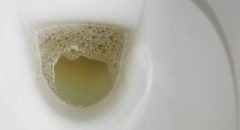
Q: What are the most common signs/symptoms of kidney failure? - S. B.
A: Kidneys help filter waste products from the blood. They are also involved in regulating blood pressure, electrolyte balance and red blood cell production in the body.
Signs of kidney failure are due to the build-up of waste products in the body that may cause weakness, shortness of breath, lethargy and confusion.
Inability to remove potassium from the bloodstream may lead to abnormal heart rhythms, and sudden death. Initially kidney failure may cause no symptoms.
Early signs of kidney failure can be found in your nails:
Linear Depressions
One type of nail change is called Beau's lines -- transverse ridges that go across the nail, affecting all of your nails. Beau's lines are a result of an acute kidney disease that interferes with the growth of the nail.
Ridged Nails
Kidney disease causes koilonychia -- ridged nails that are somewhat spoon-shaped and concave. This change is associated with iron-deficiency anemia, which commonly occurs in people with kidney disease.
White Streaks and Spots
White streaks and spots on your fingernails occur with a condition called leukonychia. This condition is associated with chronic renal disease.
Half-and-Half Nails
Half-and-half nails -- also known as Lindsay's nails -- also occur with kidney disease. The bottom portion of the nail is white, while the top of your nail is brown. Swelling of the nail bed causes the bottom of the nail to become white.
According to MayoClinic, acute kidney failure may occur when:
- You have a condition that slows blood flow to your kidneys
- You experience direct damage to your kidneys
- Your kidneys' urine drainage tubes (ureters) become blocked and wastes can't leave your body through your urine
Slow Blood Flow To Kidneys
Diseases and conditions that may slow blood flow to the kidneys and lead to kidney failure include:
-
- Diabetes
- Blood or fluid loss
- Hypertension/Blood pressure medications
- Heart attack
- Heart disease
- Infection
- Liver failure
- Use of aspirin, ibuprofen (Advil, Motrin IB, others), naproxen (Aleve, others), or related drugs
- Severe allergic reaction (anaphylaxis)
- Severe burns
- Severe dehydration
Direct Kidney Damage
These diseases, conditions and agents may damage the kidneys and lead to acute kidney failure:
- Blood clots in the veins and arteries in and around the kidneys
- Cholesterol deposits that block blood flow in the kidneys
- Glomerulonephritis (gloe-mer-u-loe-nuh-FRY-tis), inflammation of the tiny filters in the kidneys (glomeruli)
- Hemolytic uremic syndrome, a condition that results from premature destruction of red blood cells
- Infection
- Lupus, an immune system disorder causing glomerulonephritis
- Medications, such as certain chemotherapy drugs, antibiotics, dyes used during imaging tests and zoledronic acid (Reclast, Zometa), used to treat osteoporosis and high blood calcium levels (hypercalcemia)
- Multiple myeloma, a cancer of the plasma cells
- Scleroderma, a group of rare diseases affecting the skin and connective tissues
- Thrombotic thrombocytopenic purpura (TTP), a rare blood disorder
- Toxins, such as alcohol, heavy metals and cocaine
- Vasculitis, an inflammation of blood vessels
RELATED: Your Kidneys Need You, Here’s How To Help Them
Urine Blockage
Diseases and conditions that block the passage of urine out of the body (urinary obstructions) and can lead to acute kidney failure include:
- Bladder cancer
- Blood clots in the urinary tract
- Cervical cancer
- Colon cancer
- Enlarged prostate
- Kidney stones
- Nerve damage involving the nerves that control the bladder
- Prostate cancer
Unfortunately, kidney failure may be progressive in many situations and may be irreversible. The diagnosis of kidney failure usually is made by blood tests measuring BUN, creatinine, and glomerular filtration rate (GFR).
Treatment of the underlying cause of kidney failure may return kidney function to normal. Lifelong efforts to control blood pressure and diabetes may be the best way to prevent chronic kidney disease and its progression to kidney failure. As we age kidney function gradually decreases over time.
If the kidneys fail completely, the only treatment options available may be dialysis or transplant.
Reviewed by: Dr. Melvin Gaskins
 If you have any questions, don’t hesitate to 'Ask Dr. Renee'. Follow me on Twitter @AskDrRenee and on my website.
If you have any questions, don’t hesitate to 'Ask Dr. Renee'. Follow me on Twitter @AskDrRenee and on my website.









